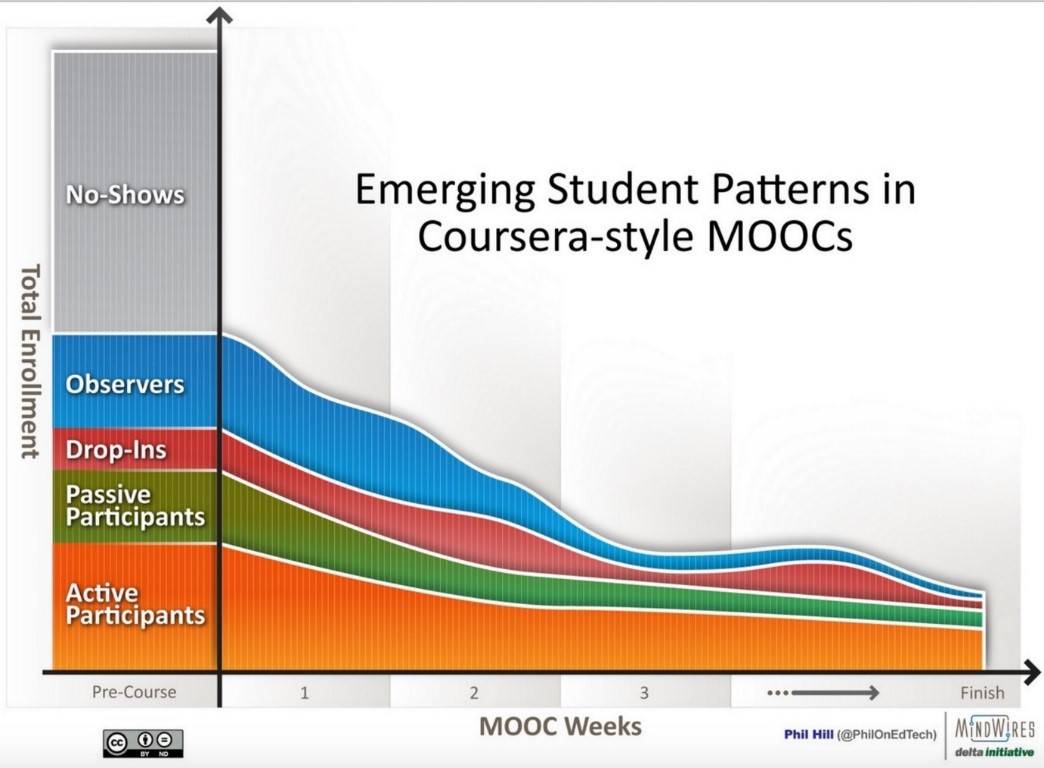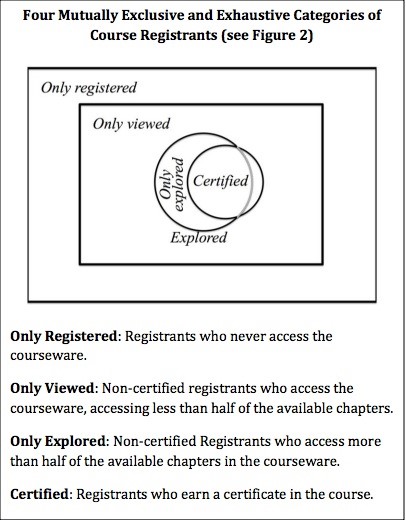5. Strengths and Weaknesses of MOOCs
5.4. Persistence and Commitment: The Onion Hypothesis
The edX researchers (Ho et al., 2014) identified different levels of commitment as follows across 17 edX MOOCs:
- Only registered: Registrants who never access the courseware (35 percent)
- Only viewed: Non-certified registrants who access the courseware, accessing less than half of the available chapters (56 percent)
- Only explored: Non-certified registrants who access more than half of the available chapters in the courseware, but did not get a certificate (4 percent)
- Certified: Registrants who earn a certificate in the course (5 percent)
Hill (2013) has identified five types of participants in Coursera courses:

Engle (2014) found similar patterns (also replicated in other studies) for the University of British Columbia MOOCs on Coursera:
- Of those that initially sign up, between one third and a half do not participate in any other active way.
- Of those that participate in at least one activity, between 5-10 percent go on to successfully complete a certificate.
Those going on to achieve certificates usually are within the 5-10 percent range of those that sign up and in the 10-20 percent range for those who actively engaged with the MOOC at least once. Nevertheless, the numbers obtaining certificates are still large in absolute terms: over 43,000 across 17 courses on edX and 8,000 across four courses at UBC (between 2,000-2,500 certificates per course).
Milligan et al. (2013) found a similar pattern of commitment in cMOOCs, from interviewing a small sample of participants (29 out of 2,300 registrants) about halfway through a cMOOC:
- Passive participants: In Milligan’s study these were those that felt lost in the MOOC and rarely but occasionally logged in.
- Lurkers: They were actively following the course but did not engage in any of the activities (just under half those interviewed).
- Active participants (again, just under half those interviewed) who were fully engaged in the course activities.

This is remarkably similar to what I wrote in 1984 about the onion hypothesis of educational broadcasting in Britain (Bates, 1984):
(p.99): At the center of the onion is a small core of fully committed students who work through the whole course, and, where available, take an end-of-course assessment or examination. Around the small core will be a rather larger layer of students who do not take any examination but do enroll with a local class or correspondence school. There may be an even larger layer of students who, as well as watching and listening, also buy the accompanying textbook, but who do not enroll in any courses. Then, by far the largest group, are those that just watch or listen to the programmes. Even within this last group, there will be considerable variations, from those who watch or listen fairly regularly, to those, again a much larger number, who watch or listen to just one programme.
I also wrote (p.100):
A sceptic may say that the only ones who can be said to have learned effectively are the tiny minority that worked right through the course and successfully took the final assessment…A counter-argument would be that broadcasting can be considered successful if it merely attracts viewers or listeners who might otherwise have shown no interest in the topic; it is the numbers exposed to the material that matter…the key issue then is whether broadcasting does attract to education those who would not otherwise have been interested, or merely provides yet another opportunity for those who are already well educated…There is a good deal of evidence that it is still the better educated in Britain and Europe that make the most use of non-formal educational broadcasting.
Exactly the same could be said about MOOCs. In a digital age where easy and open access to new knowledge is critical for those working in knowledge-based industries, MOOCs will be one valuable source or means of accessing that knowledge. The issue is though whether there are more effective ways to do this. Thus, MOOCs can be considered useful – but not really revolutionary -contribution to non-formal continuing education.
